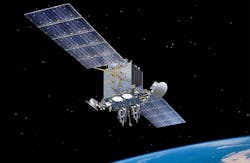Lockheed Martin to provide support and obsolescence mitigation to bring AEHF SATCOM online
LOS ANGELES AFB, Calif., 8 July 2015. Lockheed Martin Corp. won a couple of contracts last week to help bring the U.S. military's Advanced Extremely High Frequency (AEHF) high-bandwidth satellite communications (SATCOM) network on line.
Officials of the U.S. Air Force Space and Missile Systems Center at Los Angeles Air Force Base, Calif., is awarding two contracts cumulatively worth $85.3 million to the Lockheed Martin Space Systems segment in Sunnyvale, Calif., to make improvements to the AEHF system in preparation for full operational capability.
The AEHF system provides fast wideband global, survivable, protected communications capabilities for strategic command and tactical warfighters operating on the ground, at sea, and in the air. The jam-resistant system also serves Canada, the Netherlands, and the United Kingdom.
The Air Force last Thursday awarded Lockheed Martin Space Systems a $53.5 million contract for AEHF mission planning to help move the system from initial operational capability to full operational capability.
The same day the Air Force awarded a $31.8 million contract to Lockheed Martin to refresh AEHF mission control equipment to switch out obsolete hardware and software to support the post-initial operational capability transition to sustainment.
Related: Lockheed Martin completes on-orbit testing of AEHF Satellite
One AEHF satellite provides greater total capacity than the entire legacy five-satellite Milstar strategic SATCOM constellation, Lockheed Martin officials say. AEHF will increase individual user data rates five-fold to provide real-time video, battlefield maps, and targeting data, in addition to voice and data.
The AEHF also provides protected communications links for national command authorities like the president and joint chiefs of staff, in all levels of conflict. Lockheed Martin is under contract to deliver six AEHF satellites and the mission control segment. Initial operational capability of the system this year.
Lockheed Martin is the AEHF prime contractor, while Northrop Grumman Aerospace Systems in Redondo Beach, Calif., is the payload provider. Lockheed Martin built the legacy Milstar satellites, and is the prime contractor on the U.S. Navy’s Mobile User Objective System (MUOS), next-generation narrowband tactical satellite communications system.
On the contracts awarded last week, Lockheed Martin will do the work in Sunnyvale, Calif.; Los Angeles; Colorado Springs, Colo.; and Philadelphia, and should be finished by June 2017.
For more information contact Lockheed Martin Space Systems online at www.lockheedmartin.com/us/ssc, or the Air Force Space and Missile Systems Center at www.losangeles.af.mil.

John Keller | Editor
John Keller is editor-in-chief of Military & Aerospace Electronics magazine, which provides extensive coverage and analysis of enabling electronic and optoelectronic technologies in military, space, and commercial aviation applications. A member of the Military & Aerospace Electronics staff since the magazine's founding in 1989, Mr. Keller took over as chief editor in 1995.

